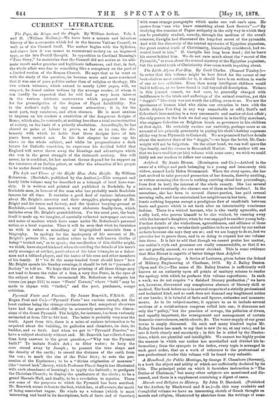Pyramid Facts and Fancies. By James Bon wick, F.R.G.S. (C.
Regan Paul and Co.)—" Pyramid Facts" are curious enough, not the least curious being the strange circumstance that competent observers have had the greatest difficulty in accurately measuring the dimen- sions of the Great Pyramid. The height, for instance, has been variously estimated at from 729 to 448 feet. The latter is probably very near the truth. Apart from this, there is a mine of curious information to be acquired about the building, its galleries and chambers, its date, its builder, and so forth. And when we get to "Pyramid Fancies," we have a subject absolutely without end. Mr. Bonwick has collected more than forty answers to the great question,—" Why was the Pyramid built ?" To imitate Noah's Ark ; to filter water ; to keep the corn stored away by Joseph ; to present the true shape and the density of the earth ; to record the distance of the earth from the sun ; to mark the rise of the Polar Star ; to note the pre- cession of the Equinoxes; to be a "divine origination of measure" (the "sacred inch"..theory, which Professor Piazzi Smyth has illustrated with such abundance of learning); to typify the Sabbath ; to prefigure the Christian Church; to display the quadrature of the circle ; to be a grand Masonic Hall, and finally, to be a revelation to mystics. These are some of the purposes to which the Pyramid has been ascribed.
Mr. Bonwick seems to lean to the last, which has, at all events, the merit of being somewhat vague. He winds up a volume (which is most interesting and lucid in its descriptions, both of facts and of theories) with some strange paragraphs which make one rub one's eyes. He quotes from one who knew something about Lost Secrets" :—" By studying the remains of Pagan antiquity in the only way in which they can be profitably studied, namely, through the medium of the occult sciences, Caviglia had discovered the long-lost secret of the pyramids. And with the discovery of the central mysteries of Egyptian paganism, the great central truth of Christianity, historically considered, had re- vealed itself to him." M. Caviglia has long been dead ; did he leave his secret behind him. We do not care much about the "secret of the Pyramids," or even about the central mystery of the Egyptian paganism, but the central truth of Christianity does seem worth inquiring about.


































 Previous page
Previous page